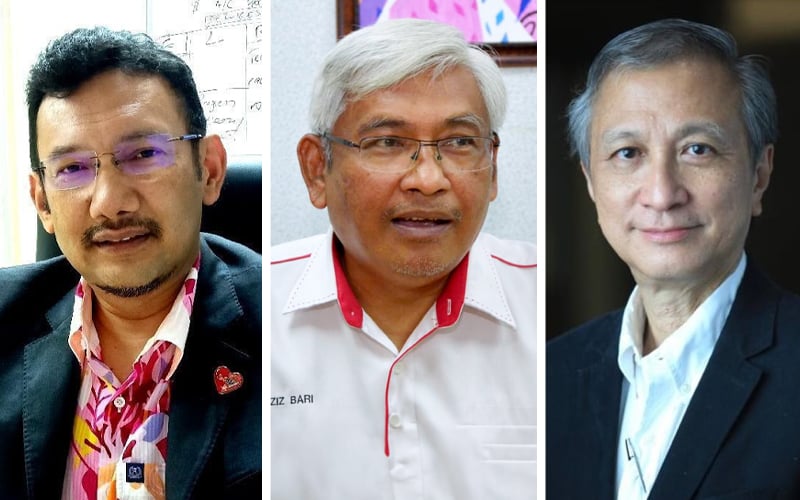FMT:
King can give opinion, but PM has final decision, says expert
Wan Ahmad Fauzi Wan Husain says decisions on government matters rests with the prime minister, except in matters involving royal prerogative and discretion.

Wan Ahmad Fauzi Wan Husain (left) and Aziz Bari (centre) said ultimate authority rests with the government, while Philip Koh said a constitutional monarch must remain above politics.
PETALING JAYA: The prime minister has the final say over government matters, although the Yang di-Pertuan Agong is entitled to share his opinion on any issue, says a constitutional expert.
“The ultimate decision rests with the prime minister, except for matters involving royal prerogative and discretion,” said Wan Ahmad Fauzi Wan Husain of ISTAC International Islamic University Malaysia.
Another constitutional scholar, Aziz Bari, said Malaysia’s system of constitutional monarchy places authority with the government, which answers to Parliament.
Wan Husain and Aziz were commenting on a proposal by the sultan of Johor, Sultan Ibrahim Sultan Iskandar, for Petronas and the Malaysian Anti-Corruption Commission to report directly to the King.
Sultan Ibrahim, who will become the Yang di-Pertuan Agong next year, gave his views when discussing his desire to eradicate corruption in the country.
In response, Prime Minister Anwar Ibrahim said he is willing to discuss the proposal.
He said Sultan Ibrahim’s suggestion was not unconstitutional and would not affect the separation of powers between the monarch and the executive.
Philip Koh, an adjunct professor of law at Universiti Malaya, said the issue of the King’s involvement in executive matters could become controversial as it could involve the monarchy in “political-business thickets.”
“The wider issue of whether it is good for the King to be directly involved in executive enforcement bodies and government-linked companies gives rise to contesting issues of whether a ruler should enter such domains,” he said.
“It could draw the King into political disputes or situations that are considered unsuitable for a constitutional monarch, who is typically expected to remain above politics and partisan interests.”
Wan Ahmad said no legal issue would arise from having the anti-graft agency and the national petroleum company report directly to the King “as long as it follows the law”.
“If a new practice needs to be introduced beyond the scope of Article 40(1) of the Federal Constitution, then a bill must be tabled,” he said.
The constitution stipulates that the King shall act in accordance with the advice of the Cabinet or of a minister acting under the general authority of the Cabinet except otherwise provided.
It also states that the King is entitled to any information available to the Cabinet concerning the government.
Aziz, a former law lecturer, said the new King has every right, and a duty, to put things right if certain agencies do not function properly.
However, the Tebing Tinggi assemblyman suggested that the King could intervene under “exceptions” to the constitutional doctrine of separation of powers, rather than through the introduction of a new set of rules.
PETALING JAYA: The prime minister has the final say over government matters, although the Yang di-Pertuan Agong is entitled to share his opinion on any issue, says a constitutional expert.
“The ultimate decision rests with the prime minister, except for matters involving royal prerogative and discretion,” said Wan Ahmad Fauzi Wan Husain of ISTAC International Islamic University Malaysia.
Another constitutional scholar, Aziz Bari, said Malaysia’s system of constitutional monarchy places authority with the government, which answers to Parliament.
Wan Husain and Aziz were commenting on a proposal by the sultan of Johor, Sultan Ibrahim Sultan Iskandar, for Petronas and the Malaysian Anti-Corruption Commission to report directly to the King.
Sultan Ibrahim, who will become the Yang di-Pertuan Agong next year, gave his views when discussing his desire to eradicate corruption in the country.
In response, Prime Minister Anwar Ibrahim said he is willing to discuss the proposal.
He said Sultan Ibrahim’s suggestion was not unconstitutional and would not affect the separation of powers between the monarch and the executive.
Philip Koh, an adjunct professor of law at Universiti Malaya, said the issue of the King’s involvement in executive matters could become controversial as it could involve the monarchy in “political-business thickets.”
“The wider issue of whether it is good for the King to be directly involved in executive enforcement bodies and government-linked companies gives rise to contesting issues of whether a ruler should enter such domains,” he said.
“It could draw the King into political disputes or situations that are considered unsuitable for a constitutional monarch, who is typically expected to remain above politics and partisan interests.”
Wan Ahmad said no legal issue would arise from having the anti-graft agency and the national petroleum company report directly to the King “as long as it follows the law”.
“If a new practice needs to be introduced beyond the scope of Article 40(1) of the Federal Constitution, then a bill must be tabled,” he said.
The constitution stipulates that the King shall act in accordance with the advice of the Cabinet or of a minister acting under the general authority of the Cabinet except otherwise provided.
It also states that the King is entitled to any information available to the Cabinet concerning the government.
Aziz, a former law lecturer, said the new King has every right, and a duty, to put things right if certain agencies do not function properly.
However, the Tebing Tinggi assemblyman suggested that the King could intervene under “exceptions” to the constitutional doctrine of separation of powers, rather than through the introduction of a new set of rules.
No comments:
Post a Comment